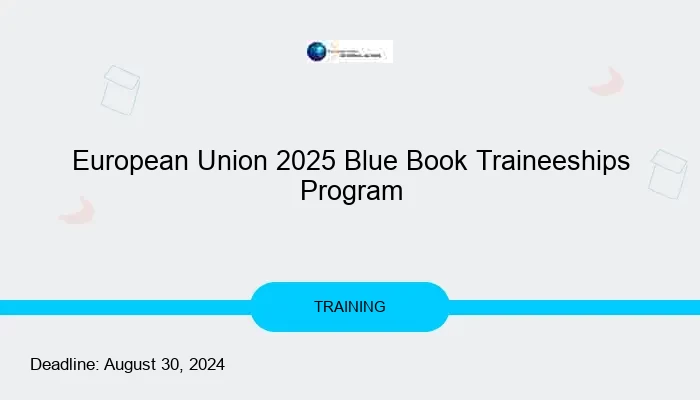European Union 2025 Blue Book Traineeships Program
Published: 19 Jul 2024
Subscribe for scholarship alert!

The European Union Blue Book Traineeships Program 2025, also called the EU Traineeships Program, lets young professionals gain practical experience in the European Union. Traineeships are available in various EU institutions like the European Commission, the European Parliament, and the European Council. Students and recent graduates from around the world can apply. Applicants must have a university degree, be fluent in at least two official EU languages, and provide proof of their academic qualifications.
EU Blue Book Traineeships Program
| Application Deadline | August 30, 2024 |
| Type | Training |
| Sponsor | European Union (EU) |
Subscribe for scholarship alert.
Be among the first to know whenever new European Union scholarship is going on.
EU Blue Book Traineeships Program Benefits
- A monthly stipend of 1.376,89 for trainees;
- Visa expenses;
- Payment of medical costs
- Travel expenses.
- Gain practical experience in the field of study
- Learn about EU policies and decision-making processes
- Open doors to future employment opportunities
- Develop skills
- Expand professional networks
Requirements for EU Blue Book Traineeships Program
Subject to eligibility criteria, the traineeship is open to all EU citizens, regardless of age. A limited number of places are also allocated to non-EU nationals.
The traineeship programme is open to university graduates who:
- have completed a standard 3-year higher education degree (minimum EQF 6 level), corresponding to a complete Bachelor’s cycle, or equivalent. Only if you have a certificate or official confirmation from your university that you have such a degree will you be eligible to apply.
- have no prior work experience of any kind, in excess of 6 weeks in any EU institution, body or agency, delegation, with Members of the European Parliament (MEPs), or Advocates General at the Court of Justice of the European Union (EUCJ)
- have a very good knowledge of languages:
- For the administrative traineeship – you must have a very good knowledge of two EU official languages, one of which must be a working language: English, French or German at C1 or C2 level as per the Common European Framework of Reference for Languages and a second one at B2 level at least as per the Common European Framework of Reference for Languages.
For non-EU nationals, only one procedural language is required at C1 or C2 level.
- For the translation traineeship in the Directorate-General for Translation (DGT) - you must be able to translate into your main/target language (normally your mother tongue), from two other official EU languages (‘source languages’*).:
- your main/target language must be one of the official EU languages
- your first source language for translation must be a working language of the EU: English, French or German (C level or mother tongue)
- your second source language can be any of the official EU languages with at least B2-level proficiency
* At least one of the source languages you offer must be French, English or German. This is because:
-
the EU receives a large volume of translations and documents in French, English or German
-
French, English and German are the languages that EU staff members most frequently use in their work
Most documents sent to DGT in languages other than French, English and German come from the Member States. Some documents come from international organisations and national associations that write to the Commission in English.
Selection Process
Your application is assessed on basis of academic profile, language skills and additional competences, skills and qualities, such as having an international profile, work experience, certificates and other achievements.
Quotas by nationality are applied to EU candidates to ensure a spread of nationalities, with safeguards to ensure that smaller countries are adequately represented.
Third countries are grouped together in a single quota.
Application Documents
- You will have to provide the following documents:
Check also:
Fully Funded: University of Manchester Humanitarian Scholarships 2026
Application Deadline
August 30, 2024How to Apply
Interested and qualified? Go to
European Union (EU) on webgate.ec.europa.eu to apply
If you are a new user, register on European Commission Authentication Service (EU Login) to begin your application.
EU Login
- click here to create an account
- fill in the sign-up form
- click 'submit'
- check your email account (including your spam folder) for confirmation
- in the email, follow the link to 'create your password'
- choose your password and submit it
- click 'proceed' to the application form
- use either the email or your EU Login username to login afterwards.
Candidates for EC traineeships cannot login using electronic IDs.
Twice a year.
- For traineeships beginning in October, registration opens in February.
- For traineeships beginning in March, registration opens in July-August of the previous year.
You must submit all supporting documents at the same time as the application form.
For more details, visit EU website
Have you benefited from our website in any way?
Tell us your story and inspire other students!
 Menu
Menu
